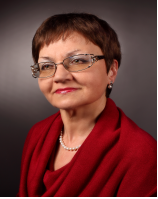7:11 PM Інформація про лекторів літньої школи |
Жаботинська Світлана Анатоліївна
The methodology called Semantics of Lingual Networks (SLN) is adopted for building conceptual ontologies applicable in lexicography and language acquisition. Here, similarly to knowledge engineering, ontology is understood as a mental model of coherent information that demonstrates relations between the key concepts. Ontologies arranging thesaurus dictionaries of particular linguistic data are multi-dimensional networks, i.e. they evolve in-depth, providing gradual granulation of information. The posited dimensions are: a conceptual sphere (the total information space of a thesaurus), domains (a network of information focus within the conceptual sphere), parcels (networks of information focuses within domains), and concepts retained in the parcel and manifested by synonymous words. In a combinatory thesaurus dictionary of set-phrases, each individual named concept is represented by a network of properties that demonstrate its combinability with the other concepts, and influence the syntactic forms of set-phrases. Therefore, the multi-dimensional model is a “networks-in-the-network” structure. It is argued that reconstruction of networks at any conceptual level employs a universal tool – the limited set of most abstract basic propositional schemas – being schemas (quantitative, qualitative, locative, temporative, and mode of being), action schemas (state-process, contact, and causation), possession schemas (part-whole, inclusion, and ownership), identification schemas (classification, characterization, and personification), and comparison schemas (identity, similarity, and likeness). The paper demonstrates their application in compiling “An English-Ukrainian-Russian Thesaurus of Scholarly Clichés” comprising over 5,000 units. In the thesaurus, the conceptual sphere SCHOLARLY RESEARCH is constituted by 13 domains: <Problem>, <Topic>, <Field>, <Hypothesis>, <Research>, <Data>, <Goal>, Methodology>, <Evidence>, <Results>, <Discussion>, <Theory>, and <Text>. The additional, linking domain is <Scholar>. The domains’ relations are provided by locative, part-whole, inclusion, contact, and causation propositional schemas. Within a domain, the links between parcels are typically represented by classification and part-whole schemas. Each parcel includes particular concepts named with the head word of a cliché. All such concepts are structured with the help of qualitative, locative, various possessive, and action schemas. E.g. PROBLEM: (1) part-whole schema – PART (array, host, layer, wash, etc.) of WHOLE (problems, questions, issues); (2) qualitative schema – SUCH (theoretically / practically oriented, theory-neutral, tricky, thorny, amenable, contested, irreconcilable, etc.) X[s] (problem, question, issue); (3) action schemas – AGENT/CAUSER (problem, question, issue) ACTS / ACTS UPON STH / MAKES STH (emerges, comes up, surfaces, enters, invades, confronts, drives, dominates, etc.); (4) action schemas – AGENT / CAUSER (field, theory, scholar, paper, etc.) ACTS UPON / MAKES (addresses, discusses, touches upon, taps into, approaches, turns to, puts, covers, views, examines, formulates, etc.) PATIENT / RESULT (problem, question, issue). The thesaurus dictionary may be used in the Academic English classroom for (1) teaching grammar (syntax) and lexicon, (2) developing conceptual modules (restricted structures) for gradual study of the material and development of students’ speaking skills; e.g. (a) FIELD / THEORY – PROBLEM – QUESTION / ISSUE, (b) SCHOLAR / PAPER – PROBLEM – FIELD, (c) PROBLEM – DATA – METHODOLOGY. The paper will demonstrate the respective teaching techniques which facilitate acquisition of the system of language per se, and construing the communicative situations compatible with the authentic ones. Trista Rappert-McGetrick
Федорів Ярослава Романівна
Сертифікати з дистанційного підвищення кваліфікації в галузі:
Яхонтова Тетяна Вадимівна
|
|
|
| Всього коментарів: 0 | |
 УКРАЇНСЬКА АСОЦІАЦІЯ КОГНІТИВНОЇ ЛІНГВІСТИКИ І ПОЕТИКИ
УКРАЇНСЬКА АСОЦІАЦІЯ КОГНІТИВНОЇ ЛІНГВІСТИКИ І ПОЕТИКИ
